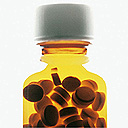
The NHS could be spending up to half a billion pounds a year too much on branded medicines, the Office of Fair Trading said this morning in a <a href=""long-awaited report into the way the health service pays for its drugs.
Some expensive branded medicines were prescribed when generic drugs costing as little as a 10th of the price would work just as well, the report said.
The OFT is recommending significant reforms to the Pharmaceutical Price Regulation Scheme, or PPRS, a voluntary system which sets a cap on the profits each drug company can earn on annual sales of branded medicines to the NHS.
The system should be changed "to deliver better value for money from NHS drug spend and to focus business investment on drugs that have the greatest benefits for patients", the report said.
The Association of the British Pharmaceutical Industry (ABPI) swiftly rejected the recommendations, saying the rising NHS drugs bill was due to increases in consumption, not prices.
Caps on pricing could hit vital research, or drive drugs companies out of the UK, it warned.
After examining the NHS's total annual spend on drugs of around £8bn, the OFT said it had identified "a number of drugs where prices are significantly out of line with patient benefits", among them some treatments for high cholesterol, blood pressure and stomach acid.
"Specifically, some drugs currently prescribed in large volumes are up to 10 times more expensive than substitute treatments that deliver very similar benefits to patients," the report said.
The OFT said the current scheme, negotiated every five years, whereby drugs firms can set their own prices within general profit guidelines, should be replaced with "a patient-focused value based pricing scheme, in which the prices the NHS pays for medicines reflects the therapeutic benefits they bring to patients".
This "greater value for money" could free up £500m from the current annual drug bill which could be used to make more medicines and treatment available to patients, the OFT estimated.
The benefits would also be felt by other countries, as some use the PPRS as a benchmark for the prices they pay for the same drugs, the report noted.
"This report provides a comprehensive assessment of the PPRS and identifies a number of areas where the scheme could be improved," said OFT chief executive John Fingleton.
"Focusing prices on the needs of patients rather than on the costs of drug companies would be good for both patients and for business," he said.
"It would allow more patients better access to more effective treatments and it would focus drug company innovation and investment on the areas where patients need it the most, creating more valuable drugs in the future."
However, the ABPI warned that drug companies could move their operations out of Britain if they felt they were not being properly rewarded for expensive research activities.
"We have to do everything we can to keep research and development here," said ABPI director general, Dr Richard Barker.
The organisation - which claims the price of medication has fallen 21% in real terms over the past decade - backed making the scheme more flexible but wanted gradual change, "not a revolution", he added.
The Department of Trade and Industry and the Department of Health have 120 days to respond to the OFT's findings.
In a statement, the DoH said it wanted to have "fair prices which give value for money to the taxpayer", adding: "However, we recognise the importance of the pharmaceutical industry to healthcare and the development of medical advances and it is in all of our interests to encourage research and reward innovation."
The shadow health secretary, Andrew Lansley, said a revised pricing scheme was "potentially welcome".
"But we also recognise that the PPRS has other vital objectives in promoting UK-based research and development, and exports," he said.
Labour MP Kevin Barron, who chairs the select committee, said changes could hit a successful British industry.
"Manufacturing pharmaceuticals in this country is still a very strong area of our economy, exporting something over £7bn a year," he told BBC Radio 4's Today programme.
"We should make sure we don't throw the baby out with the bath water."
However, Liberal Democrat health spokesman Norman Lamb called the current scheme "a massive hidden subsidy to drug companies".
"It seems ridiculous that drug companies get a set deal on pricing, which bears little relation to how effective treatments are for patients," he said.
The current PPRS runs from 2005 to 2010, and allows drug companies to make returns on capital of between 8.4% and 29.4% in supplying branded products to the NHS.
The OFT report had little impact on the pharmaceuticals sector this morning, with shares in GlaxoSmithKline edging 2p higher to £14.95 and AstraZeneca 8p higher at £29.38.
· Email business.editor@guardianunlimited.co.uk

